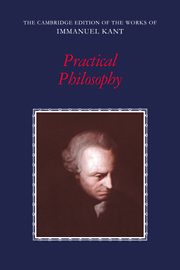Book contents
- Frontmatter
- Contents
- General editors' preface
- Preface
- General introduction
- Review of Schulz's Attempt at an introduction to a doctrine of morals for all human beings regardless of different religions (1783)
- An answer to the question: What is enlightenment? (1784)
- On the wrongfulness of unauthorized publication of books (1785)
- Groundwork of The metaphysics of morals (1785)
- Review of Gottlieb Hufeland's Essay on the principle of natural right (1786) [translated and edited by Allen Wood]
- Kraus's review of Ulrich's Eleutheriology (1788)
- Critique of practical reason (1788)
- On the common saying: That may be correct in theory, but it is of no use in practice (1793)
- Toward perpetual peace (1795)
- The metaphysics of morals (1797)
- On a supposed right to lie from philanthropy (1797)
- On turning out books (1798) [translated and edited by Allen Wood]
- Editorial notes
- Glossary
- Index of names
- Index of subjects
An answer to the question: What is enlightenment? (1784)
Published online by Cambridge University Press: 05 June 2012
- Frontmatter
- Contents
- General editors' preface
- Preface
- General introduction
- Review of Schulz's Attempt at an introduction to a doctrine of morals for all human beings regardless of different religions (1783)
- An answer to the question: What is enlightenment? (1784)
- On the wrongfulness of unauthorized publication of books (1785)
- Groundwork of The metaphysics of morals (1785)
- Review of Gottlieb Hufeland's Essay on the principle of natural right (1786) [translated and edited by Allen Wood]
- Kraus's review of Ulrich's Eleutheriology (1788)
- Critique of practical reason (1788)
- On the common saying: That may be correct in theory, but it is of no use in practice (1793)
- Toward perpetual peace (1795)
- The metaphysics of morals (1797)
- On a supposed right to lie from philanthropy (1797)
- On turning out books (1798) [translated and edited by Allen Wood]
- Editorial notes
- Glossary
- Index of names
- Index of subjects
Summary
Introduction
Since the eighteenth century was the “Age of Enlightenment,” it was appropriate to ask “What is Enlightenment?” Kant's answer to the question appeared in the December 1784 issue of the Berlinische Monatsschrift. As his concluding note indicates, the September issue, which Kant had not yet received, contained an essay on the same topic by Moses Mendelssohn. The occasion for both replies to the question could have been an essay in the December 1783 issue, “Is It Advisable to Sanction Marriage through Religion?” by Johann Friedrich Zöllner, which contained the passage “What is Enlightenment? The question, which is almost as important as the question What is truth?, should be answered before one begins to enlighten others. And yet I have never found it answered anywhere.”
As might be expected, Kant's answer and Mendelssohn's were not in agreement. Consistently with his eudaimonism, Mendelssohn had located enlightenment in the cultivation of what Kant would call the theoretical, as distinguished from the practical, use of one's intellectual powers. To this extent, Kant's reply to Garve in “Theory and Practice” would serve against Mendelssohn as well.
Kant's insistence upon freedom of the press, in the present context as the instrument of enlightenment, reappears in virtually all his political writings. A number of points introduced here – Kant's distinction between the public and the private use of reason, his principles of scriptural exegesis, his views about what kind of sect a government could sanction consistently with its own interest – were elaborated in a treatise written in 1794, which had to be withheld from publication because of the repressive measures of Frederick the Great's nephew and successor.
- Type
- Chapter
- Information
- Practical Philosophy , pp. 11 - 22Publisher: Cambridge University PressPrint publication year: 1996
- 71
- Cited by



